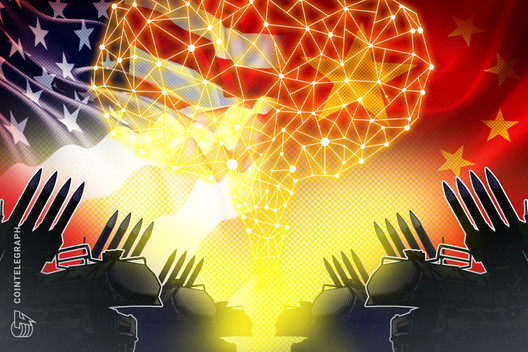Digital cold war? United States and China vie for blockchain supremacy
As the tech standoff heats up, China launching a CBDC before the U.S. “absolutely does not guarantee global financial preeminence.”
Two nations, two visions of the financial future: “The tech cold war is here — and the US isn’t winning,” wrote Ripple co-founder Chris Larsen in an opinion piece for The Hill recently. According to him, China has “a once-in-a-century opportunity to wrest away American stewardship of the global financial system, including its ultimate goal of replacing the dollar with a digital yuan.” Western values of openness and freedom could be lost in this new financial order.
Others have sounded similar concerns. “There is a new space race. It is the cyberspace race of building and controlling the systems and governance that will power the digital economy,” wrote Perianne Boring, president of the Chamber of Digital Commerce. While the race includes other advanced technologies such as artificial intelligence, big data and the Internet of Things, blockchain is key, as China’s president, Xi Jinping, has noted. Alex Tapscott, co-author of the book Blockchain Revolution, told Cointelegraph:
“China is on the brink of launching its own digital currency while, at least on this issue, the United States is dragging its feet. The two visions for these central bank digital currencies (CBDCs) couldn’t be more different. Whereas the U.S. wants to protect the U.S. dollar as global reserve currency, China wishes to export its own economic model around the world and tighten control at home.”
Overheated rhetoric?
Is this all just hype — scaremongering to gain some local advantage? Those raising the CBDC alarm may be overlooking some recent trends, such as de-globalization. According to an Aug. 14 report from Barclays: “The impact of COVID-related measures is likely to accelerate already established trends, such as de-globalisation”; i.e., the decreasing economic interdependence and integration among countries. That, in turn, could mean the question of who dominates the planet’s reserve currency will become increasingly moot.
Lone Fønss Schrøder, CEO of blockchain solution Concordium, told Cointelegraph that the threat to Western values from a new global CBDC — i.e., a digital yuan — is exaggerated: “I don’t think that’s a problem.” There’s been a tendency since the COVID-19 crisis for businesses and consumers to look for “deliverables” closer to home, Schrøder said. Rather than a new dominant world currency, a more likely solution is the rise and expansion of local currencies in a more decentralized world.
As a non-executive director of the board at Swedish home furnishings retailer IKEA, Schrøder recently participated in a board discussion around the question: Is the present COVID-hobbled global economy the new normal, or is it just a pause in globalization? She shared with Cointelegraph:
“It’s a big tendency — this producing and buying goods close to home — particularly among the younger generation. Not only do they want to support local businesses in an economic crisis, but they don’t want to waste the globe’s energy. They don’t want to sit in Sweden eating a piece of fruit that was grown on the other side of the world.”
According to Barclays’ report, the pandemic has revealed new globalization risks, “specifically related to China’s key role in ‘just in time’ global supply chains that rely on the timely delivery of intermediary goods for production to take place.” Multinational corporations are likely to rethink how to build resilience into their supply chains; that is, “less trade with China and diversifying production centres could follow, as well as attempts to re-shore some production to domestic suppliers.”
If one takes a bird’s-eye view, above the current U.S.–China contention, the world has never been as well organized or as much at peace as the present, continued Schrøder, who also serves as non-executive chair of the board at Volvo, a Swedish car manufacturer that has been owned by China-based Zhejiang Geely Holding since 2010.
As someone who has lived in both worlds, East and West, “I believe in partnerships,” Schrøder told Cointelegraph. Volvo has built factories in China, for instance, following the same principles as those operating in Sweden. She believes that people can learn from each other, adding: “The binary situation in the U.S.” — i.e., us vs. them — “is not what we need now.”
An upset to the global monetary order?
Others view China’s CBDC ambitions with trepidation. “China’s rapid development of a central bank digital currency has the potential to upset the global monetary order,” noted the editorial board of the Financial Times recently. It represents a direct challenge to the U.S. dollar’s dominance as the global currency of choice and is intended to “bypass rival western-operated cross-border payment networks, such as Swift, which the US has used to enforce sanctions,” noted the Financial Times.
In August, Beijing announced a trial run of its digital yuan in four city hubs — Shanghai, Beijing, Guangzhou and Hong Kong — a test area with 400 million people, or about 29% of the country’s population. Around the same time, the U.S. Federal Reserve Bank of Boston announced it will collaborate with researchers at Massachusetts Institute of Technology in a multiyear effort “to build and test a hypothetical digital currency oriented to central bank uses.” The U.S. effort is minuscule in comparison with the Chinese pilot — and possibly years behind.
A digital yuan may not make a difference
Digitalizing the yuan by itself won’t necessarily ensure global financial dominance though. “Digitalization doesn’t address the lack of free convertibility of the yuan,” Andrew Collier, managing director of Hong Kong-based financial research company Orient Capital Research, told Nikkei Asian Review, adding that China’s competition with the dollar is more of a long-term strategy. That said, according to him, “the digitalization of the currency and other settlement systems gives an advantage to its (China’s) institutions, which will be significant when the currency is liberalized” — even if it won’t immediately overturn the SWIFT interbank network.
Jason Brett, founder and CEO of Value Technology Foundation — a think tank focused on blockchain technology — told Cointelegraph that China launching a CBDC before the U.S. “absolutely does not guarantee global financial preeminence. If that was the case, the Bahamas should be dominating us with its Sand Dollar for years to come. Trading partners, weapons technology, all of this matters too.” He added:
“What is more unnerving about the Chinese launching a CBDC might be ways that the technology for their digital yuan may be used to surveil other countries in all of their transactions.”
In his opinion piece for The Hill, Larsen also noted that the Chinese government is subsidizing the vast amounts of energy needed to fuel the nation’s crypto mining industry, suggesting that China effectively controls Bitcoin (BTC). If the U.S. were to lose stewardship over the world’s financial system, including cryptocurrency, all sorts of dire scenarios could emerge, in his view. A U.S. defense payment to an ally could be blocked or reversed, for instance, or “U.S. banks could have their payments restricted if they run afoul of Chinese policy goals,” said Larsen.
Something similar was suggested by technology and risk management executive Jonathan Rosenoer in a recent Cointelegraph Magazine article: “By holding authorization keys, China could freeze transactions it doesn’t like or seize digital assets by locking customers’ mobile wallets at will.”
One tech sector among many
Others suggest that any financial damage that China could do to the U.S. would be limited. Tapscott told Cointelegraph that “losing global reserve status would significantly diminish U.S. hegemony in financial markets and reduce its power globally, but it would not cripple it entirely.”
Steve Mushero, an American tech entrepreneur who founded and serves as CEO of Shanghai-based ChinaNetCloud, told Cointelegraph that a U.S.–China cold war may be shaping up on many fronts — not only tech but also trade, economics and even human rights.
If one considers the tech sector alone, however, “China does very well in digital payments, and some parts of AI like people tracking, some logistics and gaming, and some consumer stuff like TikTok, but very little else.” In the broader tech world — which encompasses dozens if not hundreds of areas including aerospace, energy, water, weather, agriculture, satellites, autonomous ships, enterprise software, cloud computing, the chip market and others — “China has few, if any, players at all,” said Mushero, adding:
“Broadly the U.S. leads nearly all technologies and generally does not care nor need anyone else; however, individual companies like Apple and some others do, and no one wants to let a big competitor grow up unfettered abroad and then come ashore as Japanese companies did with consumer electronics [in the 1980s].”
Some worry that China’s authoritarian regime has the advantage of being able to throw vast sums of money at emerging technologies like blockchain and AI, but “The Chinese way is not necessarily better,” Brett told Cointelegraph. The U.S., like other democratic countries, may be slower to act, “but once it identifies an issue, it is able to rally together to beat back totalitarian regimes, just as we did in WWII.”
There remains a risk in falling too far behind, though, and some signs are troubling, such as lower patent activity in the U.S. (the People’s Bank of China alone has filed more than 80 patents related to digital currencies, by comparison) and the Blockchain Service Network, China’s government-backed blockchain initiative that recently launched an official international website.
The future of money
Few in the crypto community, however, are likely to quarrel with Larsen’s call for a “more supportive regulatory approach to blockchain and cryptocurrencies, especially those technologies developed and used by American companies” as well as drawing attention to digital payments generally, where the U.S. has lagged. As Tapscott told Cointelegraph:
“Every thinking person must understand the stakes, battle lines and consequences of the battle for the future of money.”
After all, “AI, blockchain, and other critical technologies that will be the backbone of how the world economy runs. They will create jobs,” added Brett. “All advanced nations must make it a priority to focus on emerging technologies.”
In sum, the new U.S.–China rivalry involves more than technology; it also encompasses trading partners, economics, geopolitics, weaponry and human rights. But even within the tech sector, digital currencies and blockchain technology occupy a relatively small area.
Nevertheless, digital currencies and blockchain technology are emerging technologies that are expected to loom larger in the future, so one shouldn’t become complacent. That said, other trends like de-globalization may make the launch of the first major CBDC at scale a sideshow at best, and in any event, a digital yuan may still not have a significant global impact without convertibility, trading partners, and political and military allies.




